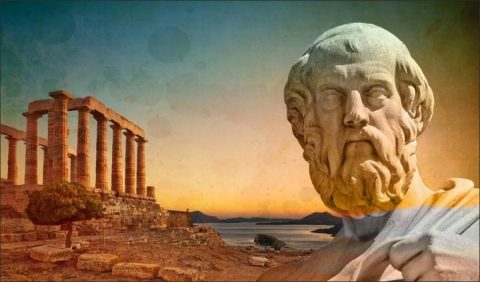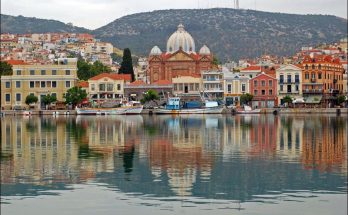Aristocles, nicknamed Plato (‘Broad-Shoulders’), was born at Athens probably in 428 B. C. After an unusually wide education he became a pupil of Cratylus, the Heraclitean philosopher. Soon, however, for he was still only twenty, he attached himself to Socrates, whose assiduous follower he remained till 399 B. C., when Socrates was put to death by the State. He then travelled widely, to Italy among other places, where he was profoundly influenced by the Pythagorean school. When forty years old he was summoned by Dionysius the Elder, tyrant of Syracuse, to exemplify and inculcate philosophy at his court; so unsuccessful was this scheme that legend says Plato was sold as a slave by Dionysius.
In any case he soon returned to Athens, and began there his career as a teacher, which continued for his remaining forty years. His school met in the grounds sacred to the hero Academus, whose name has thus been ever since associated with education. Plato paid two more visits to Syracuse, on the invitation of Dionysius the Younger, but with no greater success. He died in 347 B. C., eighty years old but still engaged in his work. The ‘Academy’ was well established, and his nephew Speusippus succeeded him as its head. It flourished as a university till the Emperor Justinian closed the schools of Athens.
The Platonic writings, about equal in volume to the Bible, comprise forty-two dialogues, thirteen letters, and certain definitions; of this mass a very small and unimportant part is spurious. The dialogues, some much more dramatic in form than others, are discussions upon the various branches of philosophic study. In nearly all the chief speaker is Socrates, though often the doctrines attributed to him can scarcely be regarded as in that sense authentic.
Their chronology is difficult, but the following facts seem certain. (i) The ‘Socratic’ dialogues are early–that is, those which give a true representation of the manner and theories of the historic Socrates. (ii) The Republic belongs to the opening of the Fourth Century, since the Ecclesiazusae of Aristophanes ( 392 B.C.) probably refers to it. (iii) The Laws is the latest, since Plato left it incomplete and it was published by his pupil Philip of Opus. It is also probable: (i) that works like the Symposium and the Phaedrus, because of their matter as well as their style, belong to the philosopher’s earlier life, perhaps a little before the Republic; (ii) that the Timaeus, Parmenides, Sophist, Politicus, and Philebus, in view of their style, scientific manner, and constructive quality, should be placed late.
Plato is at once the greatest thinker and the greatest writer of antiquity. If we set down separately the main features of his work as a philosopher and as a master of prose, it must be borne in mind that these two activities can be sundered only in theory: his style is an elucidation of his philosophy; his doctrines mould his language.
The Platonic philosophy is the consummation of all earlier Greek thought. Heraclitus held that all is flux: nothing is, everything becomes; Parmenides, that nothing exists save a nebulous entity that transcends illusory phenomena; Empedocles, that Love and Strife alternately and gradually combine and sever the four elements; Anaxagoras, that Mind originates the stir which creates phenomena; the Atomists, that empty space exists; the Pythagoreans, that the Universe is made of numbers.
This apparently chaotic divergence of philosophical schools induced distrust of all such inquiry. As a result, the Sophists gave themselves to practical training in rhetoric, politics, literature, and other arts; while Socrates rejecting, like them, transcendental studies, concentrated upon man and his improvement by clear thinking and the acquisition of general concepts. Plato, by the most audacious, most magnificent, and most profound triumph which human intellect ever achieved, produced a gigantic synthesis and reconciliation of all these dissident doctrines and methods.
The core of his system is the Theory of Ideas. The particular oak, man, or nightingale has no valid independent being; what truly exists is the Idea of Oak, of Man, of Nightingale. This Idea is beyond matter, a specific Mode of Existence, which by being carried out in matter engenders the natural kind appropriate to it –the class called men or oaks. The Idea is itself derived from God, the foundation of all existence; the world of Ideas is God’s mind as articulately thinking. These Ideas, each by itself, are the proper study of man, the only object of real knowledge. We cannot know a particular mouse or rose; knowledge is of the qualities common to all mice alike, all roses alike, in virtue of which qualities we use those names.
For knowledge is something permanently trustworthy, and what we call knowledge of the particular thing as such is not knowledge, but mere opinion–it concerns features transitory and so unknowable, precisely as Heraclitus saw. The particular mouse pursued by the farmer’s wife may lose its tail: as a recognizable individual it changes, but as a member of the class ‘mouse’ it does not. The gardeners of Alice in Wonderland caused trouble in that particular case when they painted the white roses red, but they made no difference to the science of botany.
What Plato firmly seized, then, is the validity of the natural kind. He is following the route opened up by Socrates who always insisted: ‘I do not wish you to give me instances of just (holy, beautiful, &c.) things, but to say what you mean by Justice (Holiness, &c.) itself.’ Socrates sought always the informing concept. The immense advance made by Plato was to regard this concept as an independent existence, the immaterial Idea, which man studies by examining its reproduction in matter, the natural kind. The particular members of that natural kind differ simply because matter (that is, time-and-space conditions) is an ingredient in them.
It is because of this ingredient that each fails to mirror the Idea perfectly, and this failure is what we call Evil. But though no particular represents the Idea perfectly, it does represent it, so that the whole collection of particulars by its uniform characteristics does mirror the Idea perfectly. Thus the only (though immense) difference between the Idea and the natural kind is that the former is immaterial and therefore one, the latter material and therefore multiple. This magnificent theory is the foundation of all the sciences.
But how can we detect the natural kinds, how distinguish between categories made by Nature, and categories made by man for his own convenience (e. g. quadruped, banker), how recognize the Idea? Plato answers the question by his doctrine of Anamnesis, or Recollection. This again is Socratic. Socrates called himself a midwife, claiming that he never imparted truth but only helped others to bring forth the truth which was in them. The best example of the ‘Socratic Method’ is in the Meno, where Socrates causes a slave, apparently ignorant of geometry, to evolve under question, not instruction, the method of constructing a square whose area is twice that of a given square.
It follows that knowledge is innate. Before birth, Plato holds, our souls had vision of the Ideas themselves in the supernal world, and though the vision has faded we yet retain fragments of it which wake to life when we are confronted by traces of the Ideas in our world. It is this noble conception which Wordsworth has expressed in his ‘Immortal Ode’. Plato, too, looked on Anamnesis as a proof of personal immortality. But whereas Wordsworth, profoundly distrusting reason and scientific inquiry, writes that the vision fades into the light of common day’ as we leave childhood behind, Plato believes that by science, reason, and experience the vision returns upon us stronger and more definite.
It will be observed that his explanation of the universe, his notion of human development, seem to rest exclusively upon reason–that the emotional side of God and Man is apparently neglected. It is true, speaking quite generally, that Plato does assign less importance to religion than to philosophy, although the two merge into one another. It is true also that the element in Socrates’ influence upon him which abode longest was the master’s immense intellectual sincerity and power. But Plato’s career lasted for sixty years, and the extremely brief account above given is an attempt to distil the essence of his completed doctrine, which varied not only in tenor but even more in the manner of its presentation. And at first the influence of Socrates was felt quite as strongly by his heart as by his brain. The most famous passage in his writings is that noble description in the Phaedo of his master’s death.
He recognizes that many will ridicule this belief, and he himself failed at Syracuse. When his desire was fully realized in Marcus Aurelius, the results to human happiness were small; and it is significant from several points of view that the Stoic Emperor persecuted the Christians. But Plato is convinced that his reform is the only cure for the maladies of civilization, and sets himself to eradicate, or rather exclude, from the Republic any element, however familiar hitherto, which would threaten the complete realization of his principle.
The aim being that his state should be genuinely united, he forbids his guardians and auxiliaries those two interests which create private ambitions and minor loyalties–the family and property. His rulers must have no individual possessions. All meals are to be taken in public messes. Wives and children are to be common to all, so that each youth may regard all men and women of a certain age with an equal filial respect. The women are to be educated precisely like the men and to perform the same duties, even of warfare. Plato recognizes no difference whatever, save in physical strength, between the sexes. Astounding as this was in fourth-century Athens, Plato is yet a typical Athenian in regarding women as ‘men minus x’; x is a far smaller quantity for him than for Thucydides–that is all, much though it is. The only exception to this Athenian rule is Euripides.
Another famous enactment is the exclusion of the hitherto recognized poets. They all, Homer in chief, write excellently but not for edification, since they depict such great heroes as Achilles yielding to hysterical emotion. They must make way for poets who will put such morals into their works as ‘we’ desire, and in sign of our respectful regret ‘we shall send them away to another city pouring myrrh over their heads and crowning them with wool’ (398 A). This short way with poetic genius may cause us to smile, but that is because among us–rightly, maybe–poetry is privileged. In the interests of education many to-day would have government keep a firm hand upon town-planning, architecture, and the cinematograph; and they would have Plato with them.
Visits: 325



